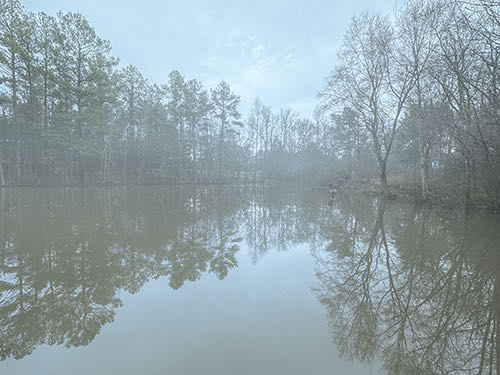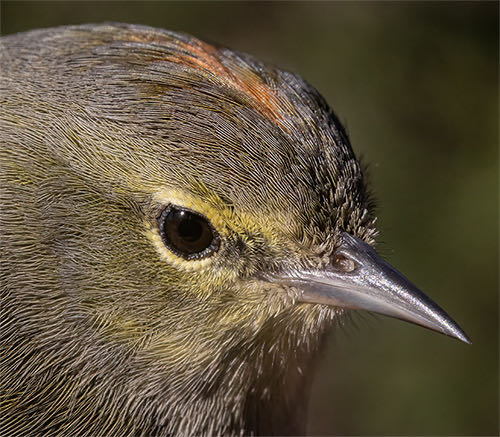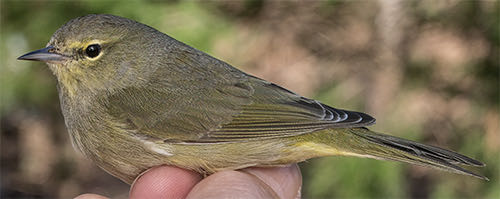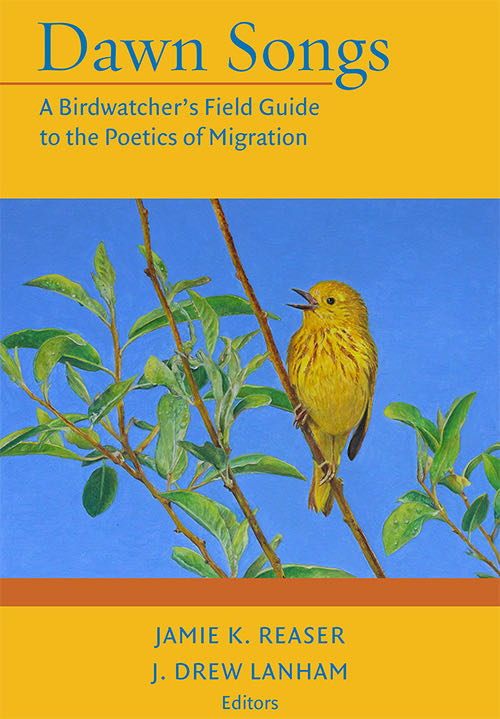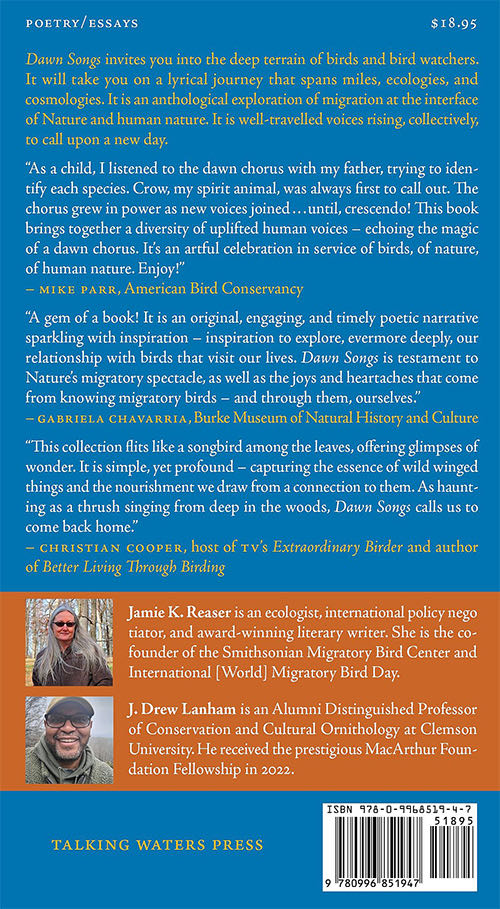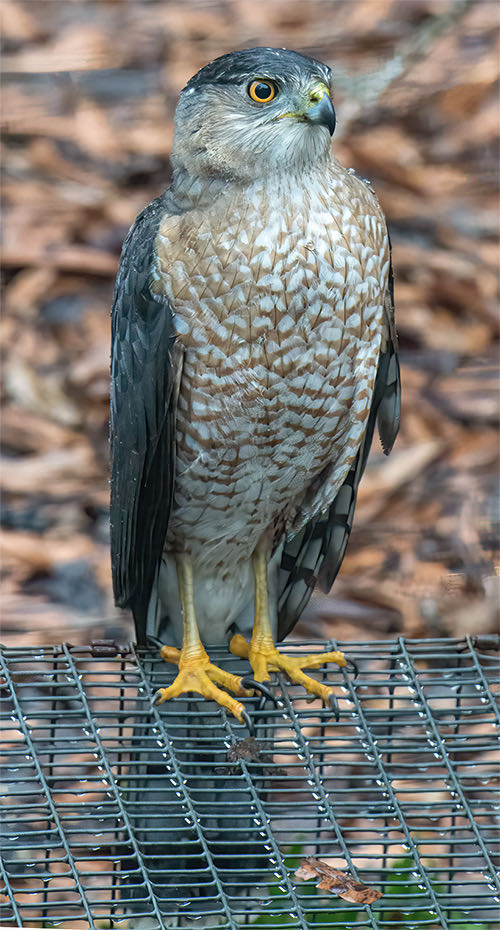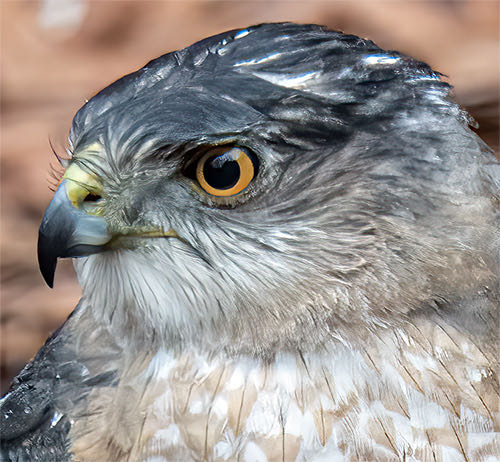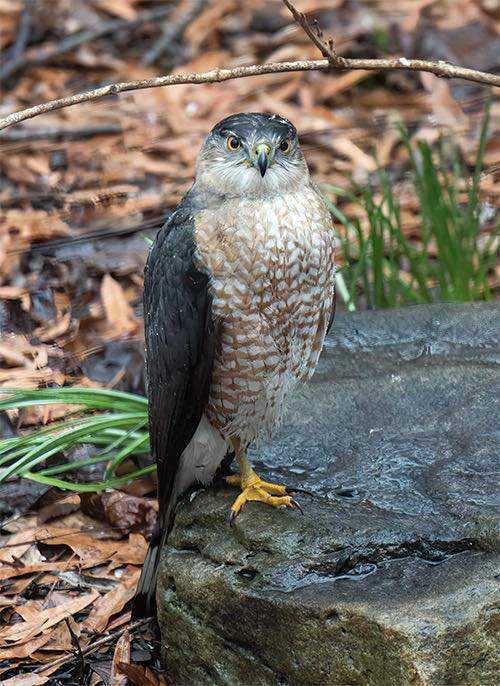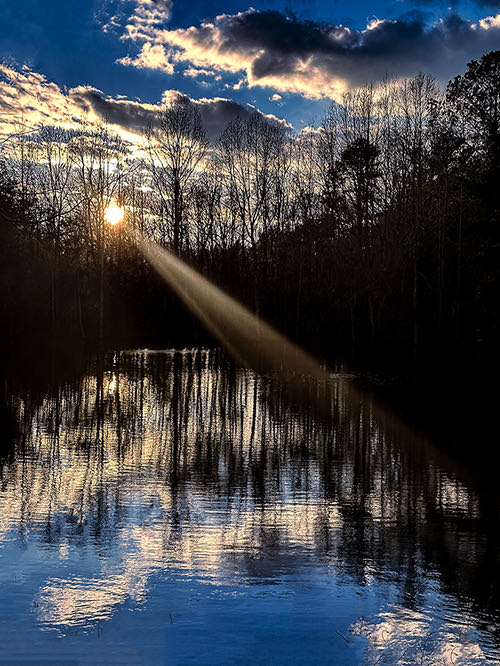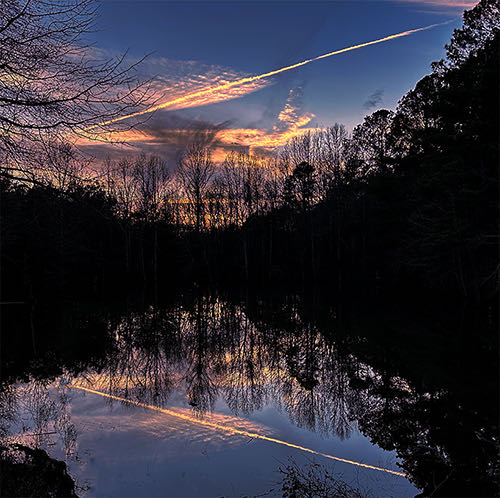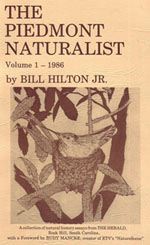- Established 1982 -HOME: www.hiltonpond.org
THIS WEEK at HILTON POND Subscribe for free to our award-winning nature newsletter (Back to Preceding Week; on to Next Week) |
(immature male Rufous Hummingbird at right) |
RAINS CONTINUE, WARBLERS APPEAR, POEMS ARE PUBLISHED, AND A As our near-drought summer ended at the Center we were concerned about heading into winter with Hilton Pond's water level nearly four feet low. Exposed mud banks meant organisms normally protected from winter cold by a blanket of warmer water might perish as temperatures dropped. It also meant all our aquatic creatures were crowded into a much smaller volume of water--perhaps 50% less than when the pond is at full stage--so Largemouth Bass and Yellowbelly Sliders were much more likely to bump noses in the pond's murky depths.
All text, maps, charts & photos © Hilton Pond Center Our low-water concerns were for naught as nearly rainless summer months gave way to several deluges during early winter. November placed a whopping 7.44" of rain in our trusty digital rain gauge, followed by 5.28" in December. Then came a very soggy 6.46" in January, which ended with several unusually warm and foggy mornings (above). We never complain about the weather and are ever grateful for precipitation that keeps our vegetation watered and Hilton Pond full. All text, maps, charts & photos © Hilton Pond Center WINTER WARBLERS Despite wet weather, this week we still had warblers flitting about at Hilton Pond Center. The vast majority of species in the Wood Warbler Family (Parulidae) that breed in North America bail out come cold weather and end up in the Neotropics. Only a few species spend winter in the Carolinas, most abundant being the Yellow-rumped Warbler. White-wing-barred Pine Warblers in much smaller numbers are year-round visitors to suet feeders in the Piedmont, while tail-bobbing Palm Warblers show up here upon occasion in winter--more commonly toward the Coastal Plain. By far our rarest parulid this time of year at Hilton Pond Center is Orange-crowned Warbler (OCWA, below). It's a plain little bird we suspect is often overlooked or even misidentified.
All text, maps, charts & photos © Hilton Pond Center As usual during winter months, on 23 January our mist nets were closed but we were running several kinds of traps at the Center, primarily to capture some of the horde of Purple Finches mobbing our feeders the past several weeks. What a surprise on the afternoon of the 23rd to find an Orange-crowned Warbler in a trap baited with black sunflower seed, where it was probably seeking leftover tidbits and/or tiny insects among the seeds. We've seen or banded very few OCWA at the Center, this latest being only the eighth in 42 years of research. (Interestingly, we also banded THREE Orange-crowned Warblers in the winter of 2021-22; those were the first captured since Fall 1998.) The species breeds across Canada in far western states where it is far more common. Eastern individuals migrate through the South Carolina Piedmont each fall and end up along the Atlantic and Gulf Coast south to Mexico.
All text, maps, charts & photos © Hilton Pond Center Adult OCWA (see photos) are uniformly olive yellow--almost nondescript--with a broken yellow eye ring and thin pale line through the eye. (Young birds in the East often have gray heads that make then resemble breeding Tennessee Warblers.) Yellow undertail converts are prominent and the bill is thin. The orange crown is hard to see; we had to blow on the head of today's bird (top photo) to reveal its eponymous field mark. (Incidentally, sexes look alike in this species.) If this winter you see what you think is a Ruby-crowned Kinglet without wing bars, look closely; it could be an elusive and somewhat larger Orange-crowned Warbler. All text, maps, charts & photos © Hilton Pond Center "DAWN SONGS" A note from Bill Hilton Jr.: Dawn Songs: A Birdwatcher's Field Guide to the Poetics of Migration contains the works of more than 60 writers and is edited by Drs. Jamie K. Reaser and J. Drew Lanham (the latter a MacArthur Fellow from Clemson University). I am excited and honored to have three of my original bird poems included in this new anthology. Check out "The Fisherbird," "The Truth About Ruby-throats," and "Birder Cat." The first two are fact-based prose-poems, while the third is whimsically sad and intended as a performance piece.
All text, maps, charts & photos © Hilton Pond Center “Dawn Songs is more than a book,” co-editor Reaser said. “It is an invocation--a calling together of birds and bird watchers across diverse landscapes and indefinite identities. It is a celebration of what unites us at the edges of nature and human nature. It is, in part, Emily Dickinson's ‘Hope [being] the thing with feathers.'” And Lanham stated: [This is] poetry purposed to inspire and conserve. Hoping that the words of so many help to widen the field of view from watching, to truly seeing." All text, maps, charts & photos © Hilton Pond Center The volume is available in paperback from on-line retailers, including Amazon and independent booksellers. All proceeds benefit the American Bird Conservancy's Conservation and Environmental Justice program, strengthening partnerships and seeking perspectives and solutions that have remained outside of mainstream biodiversity conservation. All text, maps, charts & photos © Hilton Pond Center WHITHER WENT OUR LOCAL BIRDS? Ever wonder why one minute you have a ton of birds at your feeder and suddenly they all fly away and disappear? Chances are that in addition to attracting finches and chickadees to feeders your yard is also hosting one of the accipiters--small short-winged, long-tailed hawks that make a living catching and eating even smaller birds.
All text, maps, charts & photos © Hilton Pond Center In the rain on the morning of morning of 25 January we noticed there were no songbirds chowing down on sunflower seeds at Hilton Pond Center and soon realized why. Perched on a ground trap we use to catch birds for banding was one of those predatory accipiters. Based on size, plumage, and eye color we’re calling it a relatively young male Cooper's Hawk (COHA). COHA are here year-round--some do migrate in--but this particular particular raptor could be a local resident. In winter he has to share his feeding area with somewhat smaller Sharp-shinned Hawks (SSHA) that go back north in spring. (One of our winter-banded sharpies from the Center was recaptured in Port Huron MI in a later spring; another was found dead five summers later in Bridgeport WV.)
All text, maps, charts & photos © Hilton Pond Center COHA and SSHA are quite similar in appearance, and immatures in both species have vertical brown streaks that molt to horizontal rusty bars during their first year. Youngsters also have yellow irises that usually (but not always) darken and go orange with age; eyes in adult males are often crystalline red. When observable, sharpies have squared-off tails while Coop's have rounded tails. (In the top photo you can see rounding through the trap mesh.) When trying to identify the two species we also look at their exposed legs and toes; they're pencil-thin in SSHA--hence the name "sharp-shinned." In both these accipiters females are larger than males by about a third, but there is size overlap between the species. Thus, a big female Sharp-shinned Hawk is bigger than the smaller male Cooper's Hawk. The bird on the trap was relatively small, so we're calling it a male. (In-hand measurements would be needed to confirm.)
All text, maps, charts & photos © Hilton Pond Center Today's raptor sat on the trap in the downpour for perhaps 20 minutes while we photographed him through a double-paned window--raindrops falling from his decurved bill as he soggily surveyed the area for prey. After a while he moved from the trap to a nearby rock (above) and then to a tree overhead. The Cooper's Hawk eventually flew away and all the songbirds came right back to our feeders to dine in peace. We suspect the accipiter will also return when hunger gets the best of him, and we have no problem with that. After all, Hilton Pond Center is a feeding station for hawks as well as hummingbirds and finches. All text, maps, charts & photos © Hilton Pond Center HILTON POND SUNSETS "Never trust a person too lazy to get up for sunrise
Sunset over Hilton Pond, 26 January 2023 Sometimes we just aim our iPhone 14 Pro camera toward the west, frame the image, click the shutter, and wait to see what appears. Sometimes we are surprised. All text, maps, charts & photos © Hilton Pond Center
Sunset over Hilton Pond, 28 January 2023 Contrail(s). Again. All text, maps, charts & photos © Hilton Pond Center Don't forget to scroll down for lists of Hilton Pond supporters and of all birds banded and recaptured during the period. Photoshop image post-processing for this page employs |
|---|
|
"This Week at Hilton Pond" is written and photographed by Dr. Bill Hilton Jr., executive director of Hilton Pond Center for Piedmont Natural History
|
|
|
Please refer "This Week at Hilton Pond" to others by clicking on this button: |
|

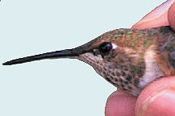 Oct 15 to Mar 15:
Oct 15 to Mar 15: